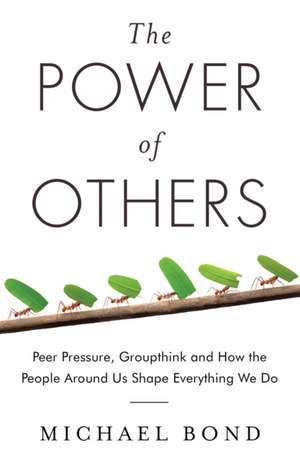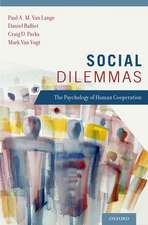The Power of Others: Peer Pressure, Groupthink, and How the People Around Us Shape Everything We Do
Autor Michael Bonden Limba Engleză Paperback – 17 mar 2015
"Entertaining, informative reading." - Kirkus Reviews
Discover how in almost every area of our lives, our behaviour is influenced far more by others than we'd like to imagine.
Teenage cliques, jihadist cells, army units, polar expeditions, and football hooligans — on the face of it, each of these groups might seem exceptional, but the forces that bind and drive them can affect us all. In recent decades, psychologists have uncovered how and why our innate social urges holds huge sway over how we think and act, propelling us to both high achievement and unthinking cruelty. We are beholden to our peers, even when we think we’re calling the shots. This is the power of others.
In this captivating work, science writer Michael Bond investigates the latest breakthroughs in social psychology to reveal how to guard against groupthink, build better teamwork, identify shared objectives, become more ethical, and survive moments of isolation.
Discover how in almost every area of our lives, our behaviour is influenced far more by others than we'd like to imagine.
Teenage cliques, jihadist cells, army units, polar expeditions, and football hooligans — on the face of it, each of these groups might seem exceptional, but the forces that bind and drive them can affect us all. In recent decades, psychologists have uncovered how and why our innate social urges holds huge sway over how we think and act, propelling us to both high achievement and unthinking cruelty. We are beholden to our peers, even when we think we’re calling the shots. This is the power of others.
In this captivating work, science writer Michael Bond investigates the latest breakthroughs in social psychology to reveal how to guard against groupthink, build better teamwork, identify shared objectives, become more ethical, and survive moments of isolation.
Preț: 64.43 lei
Nou
Puncte Express: 97
Preț estimativ în valută:
12.33€ • 13.40$ • 10.37£
12.33€ • 13.40$ • 10.37£
Carte disponibilă
Livrare economică 31 martie-14 aprilie
Livrare express 14-20 martie pentru 22.42 lei
Preluare comenzi: 021 569.72.76
Specificații
ISBN-13: 9781780746531
ISBN-10: 1780746539
Pagini: 320
Ilustrații: 10 black & white halftones
Dimensiuni: 127 x 197 x 25 mm
Greutate: 0.3 kg
Editura: Oneworld Publications
Colecția Oneworld Publications
Locul publicării:United Kingdom
ISBN-10: 1780746539
Pagini: 320
Ilustrații: 10 black & white halftones
Dimensiuni: 127 x 197 x 25 mm
Greutate: 0.3 kg
Editura: Oneworld Publications
Colecția Oneworld Publications
Locul publicării:United Kingdom
Recenzii
"What’s key here, Bond would have us realize, is that your emotional and social responses to a person are heavily influenced by that person’s emotions, feelings, or body language — and not as much your own feelings or thoughts or opinions. Bond successfully uses both studies and historical examples to illustrate these types of phenomena. The Power of Others is an interesting read."
- PsychCentral
"Bond renders a worthwhile subject into entertaining, informative reading.”'
- Kirkus Reviews
"In light of recent terrorist attacks ... passages on suicide bombers and lone wolves provide social explanations of these traumatizing events. Recommended for readers curious about the social psychology and human behavior in the face of disasters."
- Library Journal
“Interesting and entertaining … Bond’s book eloquently elucidates the possible mechanisms of action behind the social contagion phenomenon…. fascinating reading for anyone who is interested in social psychology and the influence of others onto their lives.”
- In-Mind Magazine
"Important and compelling. Bond drives home a fact that we all must accept – we are never alone. The people in our lives affect every aspect of our behaviour in ways that we are often not consciously aware of."
- David McRaney, bestselling author of You Are Not So Smart
"Accessible, captivating, and fun. Though we think of ourselves as free individuals, our choices are influenced by others – and the scary thing is that we don’t realise it."
- William Poundstone, author of Are You Smart Enough to Work at Google?
- PsychCentral
"Bond renders a worthwhile subject into entertaining, informative reading.”'
- Kirkus Reviews
"In light of recent terrorist attacks ... passages on suicide bombers and lone wolves provide social explanations of these traumatizing events. Recommended for readers curious about the social psychology and human behavior in the face of disasters."
- Library Journal
“Interesting and entertaining … Bond’s book eloquently elucidates the possible mechanisms of action behind the social contagion phenomenon…. fascinating reading for anyone who is interested in social psychology and the influence of others onto their lives.”
- In-Mind Magazine
"Important and compelling. Bond drives home a fact that we all must accept – we are never alone. The people in our lives affect every aspect of our behaviour in ways that we are often not consciously aware of."
- David McRaney, bestselling author of You Are Not So Smart
"Accessible, captivating, and fun. Though we think of ourselves as free individuals, our choices are influenced by others – and the scary thing is that we don’t realise it."
- William Poundstone, author of Are You Smart Enough to Work at Google?
Notă biografică
Michael Bond has been writing on psychology and human behavior for more than 15 years as a regular contributor to New Scientist, Nature, Prospect, The Observer, The Daily Telegraph, the Financial Times, and others. He lives in London.
Extras
"Milgram was not the first postwar scientist to highlight the transforming effect of social pressures on judgement and behaviour. His experiments were strongly inspired by his PhD supervisor at Harvard, the pioneering psychologist Solomon Asch, who caused a sensation in the 1950s when he demonstrated that people will often adopt the view of the majority even when it is patently wrong. Asch’s research set-up was as novel as Milgram’s and, for his subjects, just as disconcerting.
The volunteer turned up at the lab and was asked to sit with six to eight other people, all of whom were Asch’s associates. The experimenter then placed two large white cards before the group. One of the cards showed a single vertical black line; the other had three vertical lines of various lengths, one of them identical to the line on the first card. The participants were asked in turn to identify the line that matched.
For the first couple of rounds, the answers were straightforward and predictable: the task seemed as mundane as it looked. However, in twelve of the remaining sixteen rounds, the associates deliberately called out wrong answers, choosing lines that were clearly shorter or longer than the reference line. What Asch wanted to know was how the volunteers would respond in those twelve rounds – would they continue to trust the evidence of their own eyes or would they conform to the (incorrect) majority opinion. Although the task was extremely easy, seventy-six per cent of the volunteers conformed at least once, and only a quarter of them answered correctly every
time. On average, about a third succumbed to persuasion on each round.
Asch worried deeply about the social implications of what he had observed. ‘That reasonably intelligent and well-meaning young people are willing to call white black is a matter of concern. It raises questions about our ways of education and about the values that guide our conduct’, he wrote."
The volunteer turned up at the lab and was asked to sit with six to eight other people, all of whom were Asch’s associates. The experimenter then placed two large white cards before the group. One of the cards showed a single vertical black line; the other had three vertical lines of various lengths, one of them identical to the line on the first card. The participants were asked in turn to identify the line that matched.
For the first couple of rounds, the answers were straightforward and predictable: the task seemed as mundane as it looked. However, in twelve of the remaining sixteen rounds, the associates deliberately called out wrong answers, choosing lines that were clearly shorter or longer than the reference line. What Asch wanted to know was how the volunteers would respond in those twelve rounds – would they continue to trust the evidence of their own eyes or would they conform to the (incorrect) majority opinion. Although the task was extremely easy, seventy-six per cent of the volunteers conformed at least once, and only a quarter of them answered correctly every
time. On average, about a third succumbed to persuasion on each round.
Asch worried deeply about the social implications of what he had observed. ‘That reasonably intelligent and well-meaning young people are willing to call white black is a matter of concern. It raises questions about our ways of education and about the values that guide our conduct’, he wrote."














